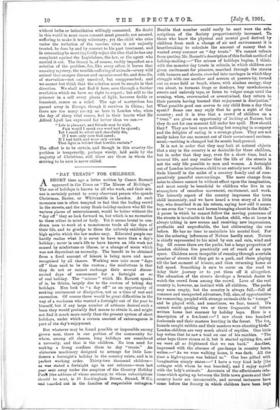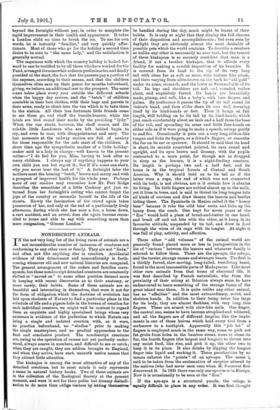" DAY TREATS " FOR CHILDREN.
ASHORT time ago a letter written by Canon Barnett appeared in the Times on " The Misuse of Holidays." The use of holidays is known to all who work, and their mis- use is certainly patent to every observant person who spends Christmas, Easter, or Whitsuntide in London. At such momenta one is often tempted to feel that the loafing crowd in the streets, and the noisy Bank-holiday-makers who fill the various places of entertainment, would be better without the " day off " they so look forward to, but which is no recreation to them either in mind or body. Yet it seems brutal to con- demn men to work at a monotonous trade all the days of their life, and to grudge to them the unlovely exhibition of high spirits which the law makes easy. Educated people can hardly realise what it is never to have more than a day's holiday ; never in one's life to have known an idle week not caused by misfortune or illnees, or a change of scene which was not dependent on necessity. The benefit to be obtained from a fixed amount of leisure is being more and more recognised by all classes. Working men take more " days off " than used to be the custom ; the misfortune is that they do not or cannot exchange their several discon- nected days of amusement for a fortnight or so of real holiday. The " misuse " which Mr. Barnett speaks of is, he thinks, largely due to the custom of taking day holidays. Men look to " a day off " as an opportunity of seeking excitement or dissipation, not as a time of rest and recreation. Of course there would be great difficulties in the way of a workman who wanted a fortnight out of the year to himself, but if any large number of artisans desired such a boon they would probably find means to obtain it, and might not find it much more costly than the present system of short holidays, under which a certain amount of extravagance is part of the day's enjoyment.
But whatever may be found possible or impossible among grown men, there is one portion of the community for whom. among all classes, long holidays are considered a necessity, and that is the children. No iron need for making a living confines them to day "treats." An elaborate machinery designed to arrange for little Lon- doners a fortnight's holiday in the country exists, and is in perfect working order. Thirty-two thousand children— as was stated a fortnight ago in our columns—were last year sent away under the auspices of the Country Holiday Fun% (the address of whose secretary, to whom subscriptions should be sent, is 10 Buckingham Street, Strand, W.C.), and boarded out in the families of respectable cottager,. Double that number could' easily be sent were the sub. scriptions of the Society proportionately increased. To those who know the physical and mental good derived by children from such a change of air and environment it is heartbreaking to calculate the amount of money that is wasted every summer on " day treats." We cannot refrain from quoting Mr. Barnett's description of this foolish method of holiday-making :—" The misuse of holidays begins, I think, with the monster day treats in schools, in which children are given excitement for pleasure, marched through the streets with banners and shouts, crowded into carriages in which they struggle with one another and scream at passers-by, turned out on some field or beach, where, with aimless energy, they run about, to torment frogs or donkeys, buy unwholesome sweets and unlovely toys, or listen to vulgar songs until the evening, when, overwearied or overstrained, they return to their parents having learned that enjoyment is dissipation." What possible good can accrue to any child from a day thus spent ? Some one may reply that he gets a sight of the country ; and it is true that a crowd of children on a " treat " are given an opportunity of looking at Nature, but they do not for one moment fall under her spell. How should they P They are bent upon nothing but romping in company and the delights of eating in a strange place. They are not really taken for one moment out of their accustomed environ- ment,—nothing is changed but its scenic background.
It is not in order that they may loo'.: at natural objects that a stay in the country is so desirable for these children, but in order that they may, even for a short time, lead a natural life, and may realise that the life of the streets is not the only life possible to men and women. A fortnight out of London introduces a child to an entirely new world. He finds himself in the midst of a country family and of com- paratively peaceful surroundings. The mere change from noise to silence cannot be without effect upon the imagination, and must surely be beneficial to children who live in an atmosphere of ceaseless movement, excitement, and work. The leisurely aspect of the country impresses the town child immensely, and we have heard a true story of a little boy, who described it on his return, saying how odd it seems to see even the " cows and horses lounging about in the fields." A pause in which he cannot follow the moving panorama of the streets is invaluable to the London child, who at home is always taking in new scenes and receiving new impressions, profitable and unprofitable, the last obliterating the one before. He has no time to assimilate his mental food. For him the sobering influences of Nature hardly exist. Nature is chiefly represented to his mind by sun and rain, wind and fog. Of course there are the parks, but a large proportion of London children live practically out of reach of an open space. Children seem incapable of running through a certain number of streets till they get to a park, and there playing till the last moment of leisure, and then returning home at full speed. Something is sure to occur on the road to delay their journey or to put them off it altogether. The education of the streets develops a feverish desire to watch the crowd from among the crowd. Love of the real country is, however, an instinct with all children. The parks may seem empty, but the country is always full,—full of romance and unexpected adventure, full, also, of opportunities for romancing, peopled with strange animals able to " lounge " and be played with, and sometimes, we fear, teased. We cannot resist quoting two or three fragments of letters written home last summer by holiday boys. Here is a description of a fox-hunt :—" I saw about two hundred foxhounds and their masters hunting in the forest. The fox. hounds caught rabbits and their masters were shooting birds." London children are very much afraid of reptiles. One little boy writes that he saw a toad on one of his rambles. "The other boys threw stones at it, but it started spitting fire, and we were all so frightened that we ran back." Another, impressed with the absence of gas-lamps in country lanes, writes :—" As we were walking home, it was dark. All the time a highwayman was behind us." One less gifted with imagination simply states :—" I have a very kind lady [the cottager with whom he was boarded], and I enjoy myself with the lady's animals." Accounts of the affectionate rela- tions which spring up between the little town guests and their country hosts are innumerable, and several instances have come before the Society in which children have been kept
beyond the fortnight without pay, in order to complete the rapid improvement in their health and appearance. It takes a London child no time to break the ice. To use his own words, he ia instantly " familiar," and very quickly affec- tionate. Most of those who go for the holiday a second time desire to be sent to " the same lady," and the satisfaction is generally mutuaL The eagerness with which the country holiday is looked for- ward to can be testified to by all those who have worked for the Fund, arranged the somewhat arduous preliminaries, and finally presided at the start, the fact that the parents pay a portion of the expense, according to their means, and that the children themselves often save up their pence for months beforehand, giving, we believe, an additional zest to the prospect. The same scene takes place every year outside the different schools when the happy day arrives, and the " batch " of children assemble in their best clothes, with their bags and parcels in their arms, ready to climb into the van which is to take them to the station. All their less fortunate little friends come to see them go, and chaff the bundle-bearers, while the labels are tied round their necks by the presiding " lydy." When the van starts, however, the chaff ceases, and the volatile little Londoners who are left behind begin to cry, and even to roar, with disappointment and envy. The last moments at the railway station are full of anxiety for those responsible for the safe start of the children. A short time ago the sympathetic mother of a little holiday- maker said to a lady in charge —well known to the present writer—" I do feel for you, Miss, having to look after so many children. I always say if anything happens to your own child you can but regret it; but if it's some one else's, why you never hear the last of it." A fortnight later the mothers meet the homing " batch," brown and merry and with a prospect of improved health for the whole year. Perhaps some of our readers may remember how Mr. Pett Ridge describes the sensations of a little Cockney girl just re- turned from her fortnight's outing who cannot forget the joys of the country or reconcile herself to the life of the streets. Slowly the fascination of the crowd again takes possession of her, and only at the end of a particularly lively afternoon, during which she has seen a fire, a horse down, a cart accident, and an arrest, does she again become recon- ciled to home and able to say with something more than mere resignation, " Gimme London."



















































 Previous page
Previous page